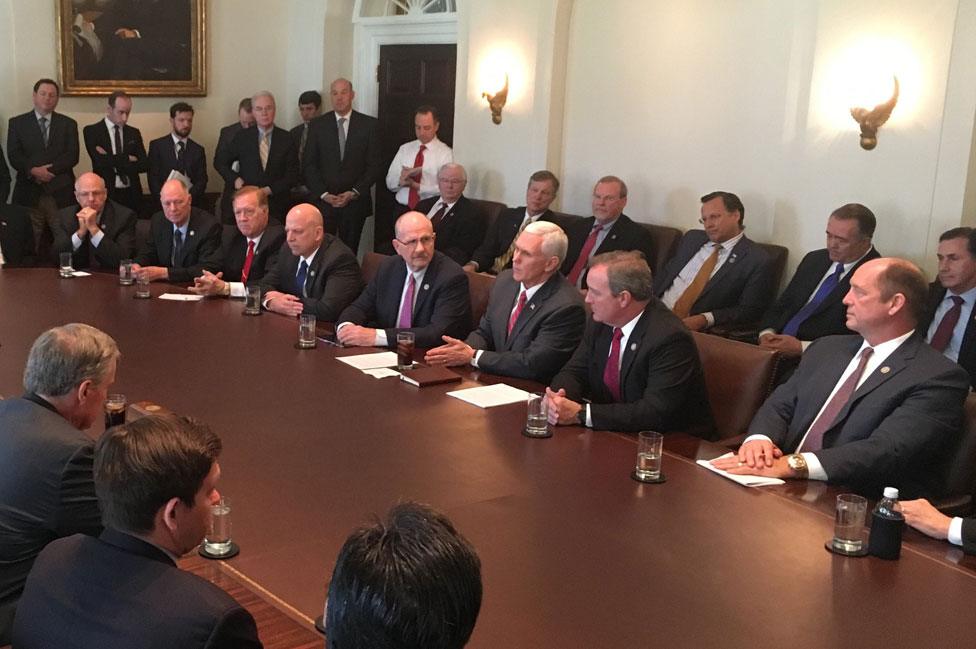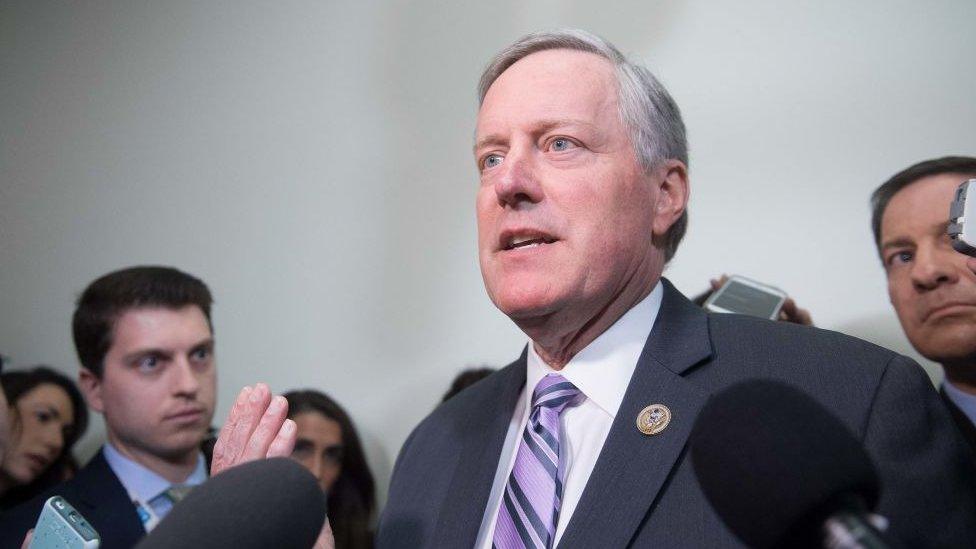Freedom Caucus: Do these 29 white men run America?
- Published

This photo of Mike Pence meeting with the Freedom Caucus drew attention to the group's lack of diversity.
A group of about three dozen men stopped President Trump's healthcare bill cold. Who are they, and how much power do they have?
President Donald Trump's first major legislative push came to a halt last week as the American Health Care Act (AHCA) failed to be given a vote. Much of the blame for the bill's failure was placed on the Freedom Caucus, a secretive group of Republicans who refused to get in line behind Speaker of the House Paul Ryan and Mr Trump.
The Freedom Caucus emerged in 2015, in response to complaints that then-Speaker of the House John Boehner tried to jam through legislation in defiance of House rules - specifically, legislation they thought wasn't conservative enough.
The caucus is "concerned about procedure, but also concerned about procedure because they're concerned about policy," said Dr Laura Blessing, a senior fellow at the Georgetown Government Affairs Institute.
The group formed to restore power to the rank-and-file Republicans, and lead the charge in opposition to the Affordable Care Act. Popular ideals among Freedom Caucus members include balanced budgets and shrinking the size of government.
How disastrous for Trump is healthcare collapse?
During the Obama administration, members drummed up so much resistance to Mr Boehner's approach to budget cuts and legislation that the speaker chose to resign rather than face a bitter intra-party battle.
Knowing exactly who is in the Freedom Caucus and how they will vote is tough. Joining the caucus is an invitation-only affair with a secret membership.
Healthcare bill 'first real test for Trump'
They assemble in closed-door meetings. Individual members often refuse to commit to a vote before consulting the rest of the caucus.
"These folks really do stick together," Dr Blessing said. "You don't really have any moderate Republicans left in the Republican conference, but these folks are markedly more conservative than their colleagues."

Mark Meadows leads the Freedom Caucus
Therein lies their power. The Freedom Caucus has about three dozen members, or a little more than 15% of House Republicans. As a voting block, it's enough to upset the 237-193 advantage Republicans have over Democrats.
Assuming a bill gets no Democratic support, Ryan cannot afford to lose a mere 23 Republican votes. That means the Freedom Caucus can make or break a bill.
Though the Caucus itself took no official position on the Trump-endorsed AHCA, meaning members could vote how they chose on the bill, most members of the Caucus wanted a full repeal of the existing healthcare law known as Obamacare.
When they didn't get it - or what they felt was a good-faith negotiation from President Trump - they refused to vote for the AHCA.
Moving forward, Dr Blessing expects to see turbulence between the Republican leadership and the Freedom Caucus on issues like tax reform, the federal budget and infrastructure spending - a costly endeavor that won't sit well with a group in favour of austerity.
That leaves Paul Ryan, tasked with drumming up support for his party's bills, facing a difficult choice.
"If he tries to get Democrats' votes, he's going to pay a price within his conference," Dr Blessing said.
Courting the Freedom Caucus may have fewer political consequences, but "he's going to face the challenge of negotiating with people who haven't had a history of negotiating much".
There's not much incentive for Freedom Caucus members to start negotiating now.
Many moderates also disliked the bill, but weren't so public - or unified - in their opposition.
The Freedom Caucus is facing much of the blame for the failure of the healthcare act, and they lost one member, Ted Poe, who said that their obstinacy was counterproductive.
"Saying no is easy, leading is hard, but that is what we were elected to do," he said.
However, individual members are polling well, and the president is not.
In Washington, that's where the real power lies.